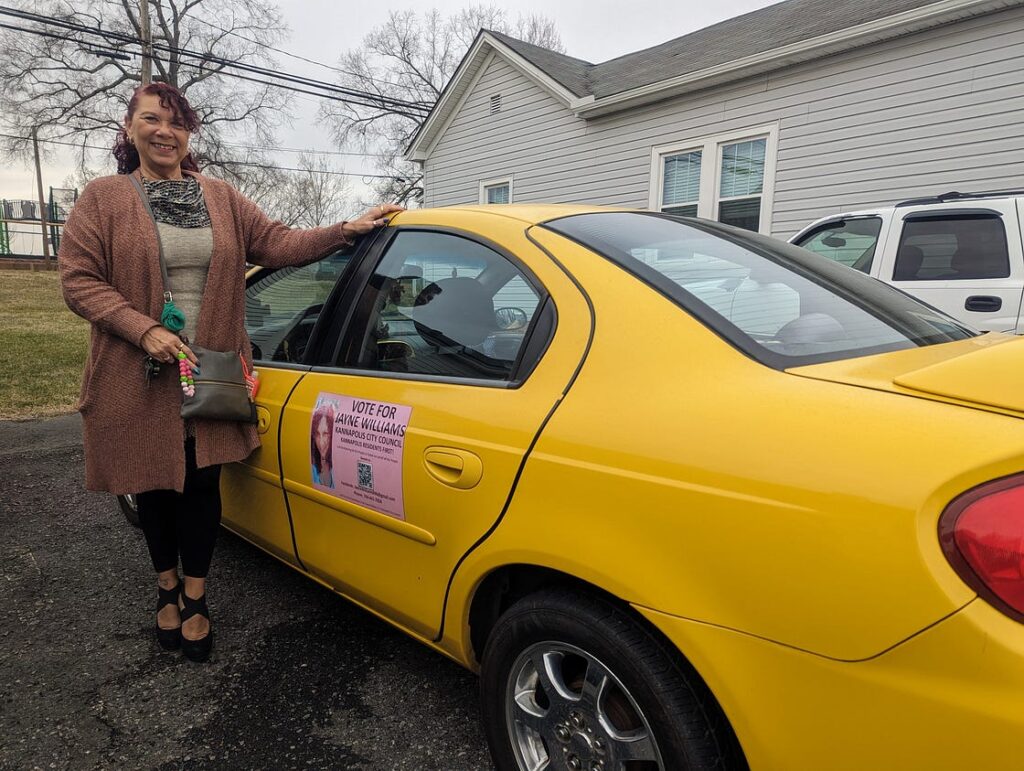By Gwen Frisbie-Fulton
It’s not hard to spot Jayne Williams on the roads around Kannapolis, North Carolina. Her Dodge Neon — which she’s always surprised didn’t break down on the way to wherever she was going– is bright yellow and sports a large pink magnet that reads: VOTE FOR JAYNE WILLIAMS.
Jayne isn’t running this year. The magnet is from last fall, but she has kept it on her vehicle “just in case anyone needs to reach out.”
Jayne earned 13% of the vote in a six-way City Council race in Kannapolis, not enough to win a seat. But even if Jayne didn’t win, her campaign was big deal for this small town. It still is.
I think often about Jayne’s candidacy and what “expertise” really means when running for office. I hope Jayne’s story will help all y’all think about what you value as you vote before and on March 5 and then again November.
Jayne doesn’t have a fancy law degree, she doesn’t run a big business, own property, and she’s not wealthy enough to retire, like a lot of people you’ll see on your ballot. But she knows what it means to be a single mother, a community caretaker, and how to make ends meet.
“I’ve worked for a living,” she told me. “I know what it’s like to struggle to get off welfare, I know what it’s like to start at $2.05 [working for tips in the service industry] and try to build it up. I know what it’s like to be hungry and to eat my children’s scraps.”
North of Charlotte and straddling the Cabarrus and Rowan County line, Kannapolis is an old textile town. Like most places, the mills here closed years ago and working folks get on at the distribution plant or in the service industry these days. “People here pay $20 on this bill, $30 on that bill, as they can,” Williams said. “They are trying to buy groceries, they are trying to pay rent.”
It’s the fact that Jayne knows this and kept it front and center during her campaign that caused such a stir. “People don’t talk about these things,” she explains. “I mean, regular people do — that’s all we talk about. But people running for office don’t.”
This isn’t just about Kannapolis. In North Carolina, more than one in six children and 1.3 million total North Carolinians live below the poverty line. Our small towns are made up of and run off the labor of poor and working people.
That’s what Williams talked about working-class issues every single day of her campaign, and she hasn’t stopped. A single mother of five, Jayne had been moving every year trying to find a safe place to land with her children. She would move somewhere that seemed okay, but “like an apple, it would get bad,” she said. Finally, she moved to Kannapolis where she has extended family. She moved into a trailer on her great-grandmother’s land.
That was 25 years ago. She raised her children and is buying the home she rented for years. Now, she wants to help make her hometown work for everyone who lives here, not just the wealthy few.
There was a time when Jayne didn’t think that people like her could run for office. “If you had told me ten years ago that I’d be doing this now,” she laughs, “I would have told you ‘You’re drunk!’”
Some people don’t take her seriously. “When I’m around well-off people, sometimes I feel like a damn idiot. And they seem to think I’m not educated and don’t look the part,” she said.
Jayne keeps her campaign magnet on the side of her car, even though the election is over. “In case people need to find me,” she explains.
But she refuses to let that stop her. Kannapolis has big challenges and the people here have big needs.

The town has nearly doubled in size in recent years and is struggling to keep up with the growth. Jayne says when she first moved here rent was $600 a month, but now it’s $1,200 or more. “But wages have barely grown,” she points out.
Jayne’s political platform was simple and direct: “We need afterschool programs for kids, we need senior centers, and, by God, we need affordable housing.”
That’s a platform for working folks, if I’ve ever seen one. It addresses the everyday needs of the many, not big corporations or businesses. My hope is people will get use to seeing people like Jayne Williams trying to earn their vote.
“It’s not easy,” she said. “Look at me: A single, biracial mom. You may not win the first time. You may not win the second time. But the people are still here. The hope is still here.”